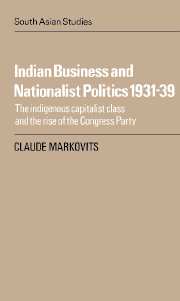 Indian Business and Nationalist Politics 1931–39
Indian Business and Nationalist Politics 1931–39 Published online by Cambridge University Press: 25 October 2009
Between July 1937 and October 1939 the political attitudes of Indian businessmen were determined by a complex interplay of national and provincial factors. The advent of Congress governments in the majority of the provinces gave crucial importance to the provincial arena of politics and provincial trends directly influenced the overall relationship between Indian big business and the Congress. However, developments on the all-India scene also contributed to shaping the politics of business. These developments mainly related to the economic and commercial policy of the Government of India which met with growing opposition from Indian business circles. Of particular importance was the negotiation of the Indo-British trade agreement which started in July 1937 and was concluded in March 1939.
Indian business and the Indo-British trade agreement
When the negotiations started in London between the two governments, the Indian advisers adopted a policy of offering concessions to Lancashire (the exact shape of which remained undisclosed) in return for a complete acceptance of the rest of their demands by the Board of Trade. This approach suited the Government of India well, since it was anxious to placate both Lancashire and Indian business and was less preoccupied with other British interests. The Indian delegation took a hard line at the outset of the negotiations, asking for a surrendering of five-sixths of the preferences enjoyed by British goods in India, the free entry of jute and other Indian manufactures into the UK, plus some extra concessions. Understandably the Board of Trade, which had to take into consideration a variety of British interests, took a very different position.
To save this book to your Kindle, first ensure [email protected] is added to your Approved Personal Document E-mail List under your Personal Document Settings on the Manage Your Content and Devices page of your Amazon account. Then enter the ‘name’ part of your Kindle email address below. Find out more about saving to your Kindle.
Note you can select to save to either the @free.kindle.com or @kindle.com variations. ‘@free.kindle.com’ emails are free but can only be saved to your device when it is connected to wi-fi. ‘@kindle.com’ emails can be delivered even when you are not connected to wi-fi, but note that service fees apply.
Find out more about the Kindle Personal Document Service.
To save content items to your account, please confirm that you agree to abide by our usage policies. If this is the first time you use this feature, you will be asked to authorise Cambridge Core to connect with your account. Find out more about saving content to Dropbox.
To save content items to your account, please confirm that you agree to abide by our usage policies. If this is the first time you use this feature, you will be asked to authorise Cambridge Core to connect with your account. Find out more about saving content to Google Drive.